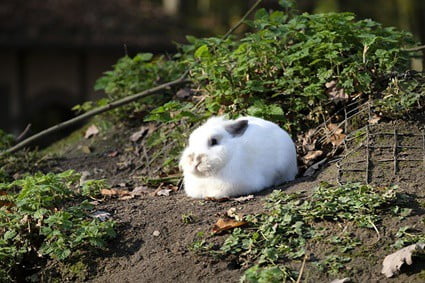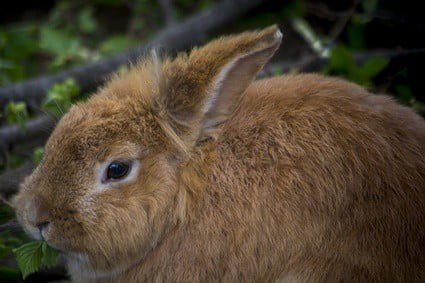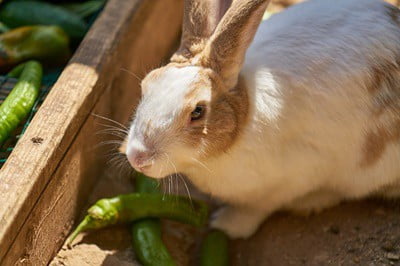Hiding is an innate instinct for rabbits. As a prey animal, a rabbit’s natural response to fear, pain, and illness is to hide. However, a rabbit will also hide for less worrisome reasons, such as to sleep or relax. Understanding a rabbit’s motivations for hiding means understanding these needs and instincts. Of course, if a rabbit hides constantly, that’s worthy of concern, as it may indicate a health problem.
Your rabbit may hide because it doesn’t feel safe any longer. Since bunnies are anxious creatures, this can be for extreme or mild reasons. Changes to the rabbit’s environment, unfamiliar noises, smells, or people, or injuries can spark an episode of anxiety. A traumatic event, such as accidently being stepped on, can also motivate hiding. If your rabbit hides itself away and refuses to eat, that may be a sign of illness or injury.
Rabbits will also hide in a variety of places. These include under sofas, beds, couches, and coffee tables, in corners and hides, and anywhere else they deem safe. Rabbits need small, dark spaces that function as mini-caves to feel safe. In these hides, they will sleep, play, groom, and relax. A bunny will also retreat to these places if it feels unsafe or unwell, or if it simply wants time to itself.
Why Do Rabbits Like To Hide?
Even the most docile bunnies will hide. If your bunny scurries away suddenly to hide, it may be:
- Frightened
- Stressed
- In pain
- Feeling unwell
However, once a rabbit has bonded with its owner, this reaction should become less frequent. After all, if the bunny is comfortable in the home, it shouldn’t feel the need to hide – out of fear or anxiety, at least. Your rabbit may hide for positive reasons too. For example, to:
- Sleep
- Lounge and relax
- Enjoy alone time
As such, providing ample, suitable hiding places is an important part of rabbit ownership. That’s especially true if you own more than one rabbit. Each will need its own hide.

Where Do Rabbits Hide?
The University of Aberdeen notes that the covert flight response is an innate instinct of rabbits. However, it can be affected by the lived experiences of each individual.
Warrens are specifically created for rabbit kits to flee into and hide in. Such behaviors remain rooted in the DNA of domestic rabbit breeds. There is an instinct to find shelter in small, dark spaces, no matter how far removed the individual is from its wild ancestors.
Domestic rabbits are not able to dig burrows. As such, they make do with whatever shelter you provide, or what they can find in the home. Here are the main places domestic rabbits will hide:
- In and under a rabbit’s hutch
- Under sofas
- Under couches
- In empty boxes
- In toy tunnels
- In corners
- Open cupboards within reach
- Gaps between furniture and walls
- Under tables and coffee tables
- Pet igloo beds
- Litter boxes
- Under beds
A truly frightened rabbit will cram itself into wherever it deems that predators cannot reach it. That may include any small, dark space in the home – which applies to nearly every nook and cranny. It may also jam itself into a corner.
It’s important to not force your rabbit out from its hiding place. Allow it to come out on its own. Of course, if it is injured or ill, you may have to gently coax it out for a closer examination.
Why Is My Rabbit Constantly Hiding?
Hiding now and then is normal. On the flipside, if your bunny hides all the time, that may concern you. Before you panic, consider if your rabbit is:
- Established in your home
- Brand new to your home
Be aware that new rabbits are very timid. It can usually take anywhere between a week and a month for a new rabbit to feel comfortable in its new home. During this time, it may prefer living tucked away in its enclosure or hides. It will eventually grow comfortable and explore the home.
After this settling-in period, your rabbit should not hide all the time. If it does, that is a bad sign.
Likewise, if an otherwise happy rabbit starts hiding 24/7, this can indicate trouble. Changes in a rabbit’s personality are often a symptom of a larger issue. A newly skittish rabbit means that something is wrong in its health or has changed in its environment.
Why Does My Rabbit Keep Hiding?
To understand your rabbit’s hiding behavior, keep an eye out for these elements. Some will be good and harmless. Others may be dangerous. With this knowledge, you can learn how to help your bunny.
Injury Or Illness
Rabbits instinctively hide injuries or symptoms of illness. Predators, like foxes, hawks, and coyotes, instinctively target weaker animals. As such, a rabbit with a visible limp or sluggish movement is the more obvious target over a healthy, spry individual. A domestic rabbit still has this instinct, even in a home where it feels completely safe.
Common rabbit illnesses will cause pain, dizziness, appetite loss, and bloating. Any of these symptoms will cause a bunny to seek shelter. If it’s bad enough, the rabbit may hide away completely.
Injuries can inspire the same response as illnesses. Rabbits are fragile animals. Even the hardier breeds, like the Flemish giant and New Zealand rabbit, can easily break a bone. Torn nails, bite wounds, sprains, fractures, and other wounds can all make a rabbit want to hide. They’ll shelter not only from the pain and weakness, but from the shock of whatever caused the injury.
Carefully observe your rabbit for any symptoms of pain, injury, or illness. If any are visible, contact your vet for advice on how to proceed.
Stress And Anxiety
Rabbits can very easily become stressed or anxious. However, a bunny needs repeat exposure to minor stressors to hide on a near-permanent basis. A one-off scare shouldn’t cause such a fuss. To hide 24/7, your rabbit may have experienced a:
- Big traumatic event
- Collection of smaller stressful elements, confined to a period of time
For example, a traumatic event may include getting stepped on by accident or attacked by another pet. Smaller events may include noisy construction work on your neighboring property. Aside from disrupting the normal atmosphere, this would introduce a fleet of loud and unfamiliar noises.
Because of this, the rabbit will have to essentially relearn that your home is safe. This can take some time, and it may require your help. We’ll go over how to help a rabbit come out of hiding further below.
Sleeping
When rabbits are totally comfortable and secure, they sleep deeply. Once you have built a loving bond with your rabbit, it may feel comfortable sleeping out in the open. However, most rabbits prefer tucking themselves into a hide. This might include under your bed, under the couch, or in a hutch.
A rabbit hiding to sleep isn’t a bad thing. After all, when resting, this prey animal is in a vulnerable state. That’s why rabbits appear to sleep with their eyes open; they are alert even during rest. While your rabbit may feel comfortable napping in your lap or being held, it may never enter true sleep out in the open.
Me Time
Rabbits are very social animals. In fact, some breeds are so communal that they’ll struggle when kept alone. Because of this, it seems odd that rabbits also enjoy a certain amount of alone time.
However, they do. A bunny will sometimes hide away from all of its companions when it wants to be alone. Owners with more than one rabbit are encouraged to provide each rabbit with its own hide for this reason.
Friction with Other Rabbits
But what if your rabbit hides all the time? In multi-rabbit homes, if one bunny constantly hides from the others, that can indicate friction.
Rabbits bond well with each other. However, they are individuals that won’t always get along. Your bunnies may act aggressively towards one another. Such a tenuous existence can cause one rabbit to retreat and hide.
Carefully watch how your rabbits interact. If there are any signs of aggression, separate the animals into different rooms or enclosures. Unless you are willing to permanently house the rabbits apart, you may have to rehome one of the animals. You can also consult with your vet about possible behavioral therapies.
Why Is My Rabbit Hiding From Me?
It’s a little heartbreaking when your bunny suddenly starts hiding from you. If you’re otherwise well-bonded with the rabbit, it can be a shock. The first step is to determine if the rabbit is truly hiding from you specifically, or from stressors around or on you. Rabbits are sensitive animals. Any number of things could spark anxiety, such as:
- Cologne or perfume
- Volume or tone of voice
- Quick or sudden movements
- Heavy footsteps
- Foreign scents, especially those which are particularly strong
In these cases, it isn’t truly you that the rabbit is hiding from. You can test each of these out and keep a record of the bunny’s responses to certain stimuli. For example:
- Do you wear perfume? Test how your rabbit responds to you when you are and aren’t wearing it.
- Do you walk with heavy footsteps, or do so when wearing certain shoes? Soften your footsteps when approaching the rabbit and see how it responds.
It doesn’t take much to upset a rabbit. Psychoneuroendocrinology states that rabbits exposed to stable social experiences are also more sociable themselves. As such, a rabbit that has inconsistent experiences with you will never know what to expect. It may consider you a potential threat.
Consistency is very important when it comes to interacting with your rabbit. Be sure to treat it like the intelligent, independent animal it is. Have you spent enough time with it? Have you given it any reason to hide from you? The damage to your bond may have been unintentional.
My Rabbit Is Hiding And Not Eating
When your rabbit is both hiding and refusing to eat, then you need to act fast. This is a sign that it is unwell or ill. When it comes to bunny health issues, a day can be the difference between recovery and death. A rabbit stops eating for a variety of health issues, including:
- Ear infections
- Dental issues
- Impaction
- Gastrointestinal stasis
All of these problems make eating painful. That can prevent the rabbit from eating at all. Such discomfort may cause the bunny to hunker down where it feels safe. It is critically important to identify if your rabbit is in pain when it refuses food. Signs of pain in rabbits include:
- Bulging eyes
- Teeth grinding (not to be confused with tooth clicking)
- Reluctance to move
- Hunched position, possibly to keep its abdomen off the ground
- Loss of appetite and/or refusal to drink
- Lethargy
- Rapid or shallow breathing
- Small or malformed fecal pellets
- Unformed cecotropes and/or uneaten cecotropes
- No bowel movements
- Unfocused eyes
If one or more of the above symptoms are present, consult with your vet immediately.

My New Rabbit Is Hiding
Introducing a rabbit to a new environment is a very stressful experience for the animal. Your home is full of strange sights, smells, and sounds. Additionally, the bunny is now surrounded by enormous creatures (humans) that it may view as potential threats.
Because of this, it can take time for the rabbit to become comfortable in your home. This process is made easier by taking certain steps. The guide below also works for:
- Introducing your existing rabbit to a new home after moving or renovating.
- Helping rabbits relearn that their home is safe.
Prepare The Room
When you first bring a rabbit home, confine it to one room of the house. Ideally, this room is where its permanent enclosure will be.
Prior to bringing the rabbit home, ensure that other pets are not able to enter the room. Encourage your family members to avoid this room for a few days as well. The less foot traffic the better.
You should remove any air-fresheners or artificial scents before setting up everything the rabbit will interact with. This includes:
- Toys
- A bed
- An enclosure
- Most importantly, a hide.
For optimal effects and to encourage the rabbit to explore the room, provide multiple hides in the space. It’s also wise to give free-roam rabbits an enclosure. After all, your bunny needs a place to feel secure.
Leave The Rabbit Alone
Once you’ve brought the rabbit home, take it to this room and leave it alone. Do not disturb the rabbit during the first few days, aside from changing out its food and water. Keep the home quiet as well. No matter how badly you want to cuddle with your new pet, leave it alone.
It can be hard, but you must be patient during this time. Forcing the rabbit out of hiding before it’s ready will only stress it out. That can trigger a number of health issues.
Let The Rabbit Know You
After the first week, the rabbit should have grown accustomed to the ambient sounds, sights, and smells of your home. Now, you can begin the process of getting the rabbit used to you. Spend some quiet time in the room with the bunny. This can include reading or performing some other quiet hobby. The rabbit will grow to understand that you aren’t a threat, and its natural curiosity will take over.
A very encouraging sign is when the rabbit goes about its business in your presence. You can coax the rabbit to approach by sitting on the floor where it can easily reach you. Be sure that it approaches you – not the other way around.
Once the rabbit is comfortable with you, you can gradually allow it to explore the rest of your home.
This entire process may take anywhere between a few days to a few weeks. Try not to be disheartened if the rabbit takes a long time to come out of hiding. Be patient, keep trying, and perhaps keep a few treats handy. By using a gentle approach, your rabbit will bond more thoroughly with you.
Are Rabbit Hides Important?
Every rabbit should have at least one dedicated hide. These are spaces of comfort and security for your bunny. By providing such shelters, you are equipping your rabbit with a place to retreat when frightened, unwell, tired, or in need of quality alone time.
Rabbits will make do by hiding under couches, sofas, beds, and other such nooks and crannies. A startled or tired rabbit may tuck itself into a corner if no such hides are available. For a rabbit to gain true rest, it needs a shelter where it feels completely safe.
Rabbits hide for a number of reasons. Not all of these reasons are bad. If you notice your rabbit hiding constantly, determine why it’s doing so and look for other symptoms.


My dwarf bunnie is 12 weeks old and had a difficult time of bonding as now it is hiding under a sofa chair ?
Did I lose her trust ? Something mater with her ?
Any advice will help as I’m new to as a bunnie owner.